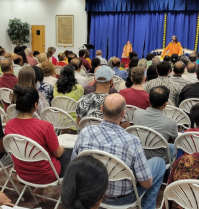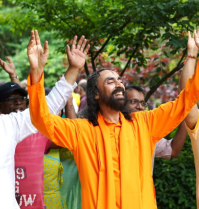Balancing Work and Spiritual Life
Inspirations for Living / March 08, 2015

How does someone balance his busy working life and think of spiritual progress?
This question haunts many aspirants from different walks of life. We sense this inability to make time for pondering over philosophical aspects of life and continue to procrastinate or ignore our inner calling. Some who have a disciplined life and have a stronger will, embark on the journey to find a deeper meaning to life which is more rewarding and fulfilling.
Work can drain our physical and mental energies, leaving us with little time for anything else. Family and social obligations take precedence over matters relating to spiritual awakening. We have dealt with this discussion in previous articles about the vagaries of mind and how a person feels stuck in the mundane activities of life, irrespective of whether he is poor or rich. One may begin to feel that his or her work is a huge burden that cannot be borne anymore.
We must realize that time must be dedicated to think and contemplate about the true source of happiness – which we all seek with great passion. After all, work for selfish needs cannot be a source of true and everlasting happiness. Everyone who has experienced it is witness to that. Once we know that true happiness lies in the spiritual realm, we will automatically dedicate time for it and begin the journey of progress towards true bliss.
All the scriptures teach us to remember and contemplate upon God, who is always with us and protecting us. It is up to the individual person to realize this truth and feel the true presence of the almighty in every atom of this creation. The Bhagavad Gita is a great source of inspirational teaching for the person who wishes to learn about true meaning of life and reaching the state of true knowledge.
The Gita and various scriptures tell us that there are two ways of remembering God and Guru. The first way is to sit down and meditate on them. The second way is to work with this consciousness that, “I am doing this work for their pleasure.” The second may be more difficult, but it takes us to a higher level of divine love. This is because it develops the spirit of service, or seva.
Even though your present job may be burdensome, you can easily do the second kind of remembrance. Whatever you earn from your job, use a portion of it to serve God and your spiritual master. In this way, by offering the fruits of your work to God, after having met your basic needs, you will develop the consciousness that you are working for his pleasure. You will then not look at your work as separate from your devotion, but as an integral part of it.
This is the Karmyog of the Bhagavad Gita:
yatkaroṣhi yadaśhnāsi yajjuhoṣhi dadāsi yat |
yattpasyasi kaunteya tatkuruṣhva madarpaṇaṁ ||
“Arjun! Whatever you do, whatever you eat, whatever austerities you perform, and whatever you give away, do it as an offering to Me.”
Along with working in this spirit, whenever you find the time, you should also practice the first kind of remembrance. Whenever you can spare the time, simply sit and think of them. This will help you block out worldly consciousness from your mind and strengthen your devotional sentiment. It is important to spend some days a year with your Guru as well, whenever your yearly schedule permits.
You may be thinking that if you did not have to work at all, then you could have spent all your time in devotion. However, there are two kinds of vairagya, or detachment. The first kind is when you find the world as painful and burdensome, and want to run away from it. Shree Krishna calls it rajasic detachment (detachment in the mode of passion):
duḥkhamityeva yatkarma kāyakleśhabhayātyajet |
sa kṛitvā rājasaṁ tyāgaṁ naiva tyāgaphalaṁ labhet ||
“Giving up one’s work, thinking it to burdensome and painful, is to be considered rajasic detachment, which it does not lead to divine fruits.”
The second kind of detachment is where you continue working, while giving up attachment to the results. In other words, your practice to become equal in pain and pleasure, success and failure, hardship and luxury, favorable and unfavorable situations. Shree Krishna calls this sattvic detachment (detachment in the mode of goodness):
kāryamityeva yatkarma niyataṁ kṛiyaterjuna |
saṅg tyaktvā phalaṁ chaiva sa tyāgaḥ sātviko mataḥ ||
“Performing one’s work, simply because it is to be performed, while giving up attachment to the fruits, is sattvic detachment.”
Hence, the proper path for spiritual progress is to practice devotion along with our prescribed work, even though it may be painful and burdensome. When our detachment develops to such an extent that we no longer find our work burdensome, no matter how difficult it may be, on then should we consider giving up work, and performing devotion full time. However, this step of karma sanyas is taken only under the guidance of the Guru. The vast majority of the people will have to do karmyog, where they continue doing their work, but make their consciousness divine.
While doing karmyog, you can remember God and Guru in other ways as well. Practice to feel their presence with you. Think that they are with you and are watching you. Make them your witness in every activity that you perform. This will help you keep your mind in the divine realm, while you do your worldly duties with your body.

























